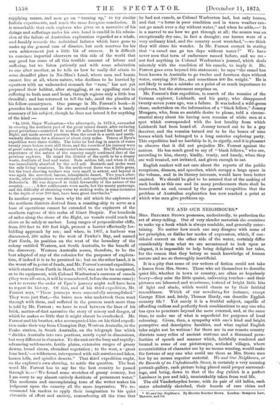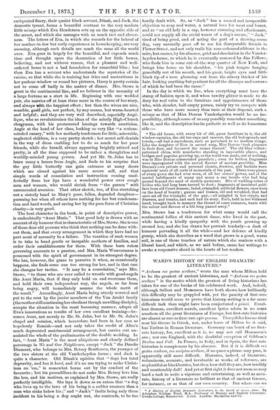WE AND OUR NEIGHBOURS.* Mits. BEECHER STOWE possesses, undoubtedly, to
perfection the art of story-telling. Out of very slender materials she contrives to make up a book which is always readable, and generally enter- taining. No matter how much one may disagree with some of her principles, or dislike her modes of expression, which, if con- sidered correct on the other side of the water, certainly differ considerably from what we are accustomed to look upon as elegant, it is impossible to help being delighted with her tales, for the reason that they betray so much knowledge of human nature and are so thoroughly inartificial.
It is a pity that some of our writers of fiction could not take a lesson from Mrs. Stowe. Those who set themselves to describe quiet life, whether in town or country, are often so hopelessly heavy—they miss the little quaint, enlivening touches—and their pictures are laboured and wearisome, instead of bright little bits of light and shade, which would charm us by their faithful resemblance. Which of our novelists,' for instance, except George Eliot and, lately, Thomas Hardy, can describe Ewlish country life ? Yet surely it is a fruitful subject, capable of affording endless and perfectly fresh combinations to any one who has eyes to penetrate beyond the mere external, and, at the same time, to make use of what is superficial for purposes of local colouring. Given, then, a sympathy with one's kind and bright perceptive and descriptive faculties, and what capital English tales might not be written ! for there are in our remote country districts many relics of ancient customs and a thousand pecu- liarities of speech and manner which, faithfully rendered and located in some of our picturesque, secluded villages, where eccentricitities of character are by no means wanting, would make the fortune of any one who could use them as Mrs. Stowe uses her by no means superior material. We and Our Neighbours, or the Records of an Unfashionable Street, is certainly a very amusing portrait-gallery, each picture being placed amid proper surround- ings, and being, down to that of the dog (which is a perfect Landseer in pen and ink), unmistakably taken from real life.
The old Vanderheyden house, with its pair of old ladies, each sister admirably sketched, their hoards of rare china and
* We and Our Neighbours. By Harriet Beecher Stowe. London: Sampson Low, Marston, and Co.
antiquated finery, their quaint black servant, Dinah, and Jack, the domestic tyrant, forms a beautiful contrast to the very modern little ménage which Eva Henderson sets up on the opposite side of the street, and which she manages with so much tact and clever- ness. The letters of Eva. in which she records for the behoof of her mother-in-law her early experiences in housekeeping, are very amusing, although such details are much the same all the world over. Eva goes in largely for the beautiful, and expends much time and thought upon the decoration of her little bower, believing, and not without reason, that a pleasant and well- ordered home is not a bad foundation for connubial bliss ; but then Eva has a servant who understands the mysteries of the cuisine, so that while she is training her ivies and nasturtiums in her parlour-window or round her pictures, Harry is pretty certain not to come off badly in the matter of dinner. Mrs. Stowe is great in the matrimonial line, and no believer in the necessity of a large fortune as a start in life. Beginning with one wedded pair, she marries off at least three more in the course of her story, and always with the happiest effect ; but then the wives are nice, sensible, goat girls, not perfect, by any means, but warm-hearted and helpful ; and they are very well described, especially Aug& lique, who so revolutionises the ideas of the saintly High-Church clergyman, with his pronounced leanings towards asceticism. Angie at the head of her class, looking so very like "a serious- minded canary," with her motherly tenderness for little, miserable, neglected children, is a very pretty sketch ; her secret self-denials in the way of dress enabling her to do so much for her poor friends, while she herself, always appearing brightly attired and pretty, is all the time supposed to be rather a thoughtless and worldly-minded young person. And yet Mr. St. John has to learn many a lesson from Angie, and finds to his surprise that the gay little butterfly can gain entrance at many doors which are closed against his more severe self, and that simple words of consolation and instruction coming unaf- fectedly from her lips have a wonderful power over rough men and women, who would shrink from "the parson" with unconcealed aversion. That other sketch, too, of Eva stretching out a sisterly hand to Mary's poor, fallen, degraded daughter— pursuing her when all others have nothing for her but condemna- tion and hard words, and saving her by the pure force of Christian charity—is very good.
The best character in the book, in point of descriptive power, is undoubtedly "Aunt Maria." That good lady is drawn with an amount of sly humour that is characteristic of Mrs. Stowe. She is one of those dear old persons who think that nothing can be done with- out them, and that every arrangement in which they have had no part must of necessity be a failure. The vocation of such women is to take in hand gentle or incapable mothers of families, and order their establishments for them. With these born rulers governing amounts to a passion, and Mrs. Maria Wouvermans is possessed with the spirit of government in its strongest degree. She has, however, the grace to perceive it when, as occasionally happens, she finds some one too strong for her, and in that case she changes her tactics. " It may be a consolation," says Mrs. Stowe, " to those who are ever called to wrestle with good angels like Aunt Maria, that if they only hold on and overcome them, and hold their own independent way, the angels, so far from being angry, will immediately assume the whole merit of the result." Accordingly, Aunt Maria being utterly worsted and put to the rout by the junior members of the Van Arsdel family (the mother still continuing her obedient though unwilling disciple), accepts the situation in the most becoming manner, adopts all Eva's innovations as results of her own excellent training—be- comes Aunt, not merely to Mr. St. John, but to Mr. St. John's chapel and mission, which heretofore had been in her eyes so hopelessly Romish—and not only takes the credit of Alice's much deprecated matrimonial arrangement, but carries out un- assisted the whole of the preliminaries of the double wedding. In fact, "Aunt Maria " is the most ubiquitous and clearly defined personage in We and Our Neighbours, except " Jack " the Dandie Dinmont, who belongs to Mrs. Betsey Benthusen, the younger of the two sisters at the old Vanderheyden house ; and Jack is quite a character. Old Dinah's opinion that " dogs hes total depravity, and hes it hard, and it's no use trying to make Christ- ians on 'em," is somewhat borne out by the conduct of the favourite ; but his peccadilloes do not make Mrs. Betsey love him the leas, and his motives, as explained by Mrs. Stowe, are really perfectly intelligible. She lays it down as an axiom that "a dog who lives up to the laws of his being is a nobler creature than a man who sinks below his ;" and "Jack's " faults being only those incident to his being a dog ought not, she contends, to be too hardly dealt with. So, as "Jack" has a rooted and insuperable objection to soap and water, a natural love for meat and bones, and as "an old lady in a cap, however caressing and affectionate, could not supply all the social wants of a dog's nature," " Jack," tired of being good, and of acting the part of a drawing-room dog, very naturally goes off to see his disreputable friends in Flower Street, and not only trails his rose-coloured ribbons in the mire, but causes, by his absence, grief and desolation in the Vander- heyden house, to which lie is eventually restored by Jim Fellows, who finds him in some out-of-the-way quarter of New York, and brings him home on his shoulder, " his pink tongue hanging gracefully out of his mouth, and his great, bright eyes and little black tip of a nose gleaming out from the silvery thicket of his hair, looking anything but penitent for all the dismays and sorrows of which he had been the cause."
In the day in which we live, when everything must have the stamp of fashion upon it, and when tawdry glitter is made to do duty for real value in the furniture and appointments of those who, with slender, half-empty purses, vainly try to compete with those who have more money than taste at their disposal, such a menage as that of Miss Dorcas Vanderheyden would be an im- possibility, although some of us may possibly remember something like it, and the description has its pathetic as well as its humorous side :— " The old house, with every bit of old, queer furniture in it, the old window-curtains, the old tea-cups and saucers, the old bed-spreads and towels,—all had a sacredness, such as pertained to no modern things. Like the daughter of Zion in sacred song, Miss Dorcas took pleasure in their dust, and favoured the stones thereof.' The old blue willow- patterned china, with mandarins standing in impossible places, and bridges and pagodas growing up, as the world was made, out of nothing, was to Miss Dorcas consecrated porcelain ; even its broken fragments were impregnated with the sacred flavour of ancient gentility. Miss Dorcas's own private and personal closets, drawers, and baskets were squirrels' nests of all sorts of memorials of the past. There were pieces of every gown she had ever worn, of all her sisters' gowns, and of the mortal habiliments of many and many a one beside who bad long passed beyond the need of earthly garments. Bits of wedding-robes of brides who had long been turned to dust ; fragments of tarnished gold- lace from old Court dresses; faded, crumpled, artificial flowers, once worn on the head of beauty ; gauzes and tissues, old and wrinkled, that had once set off the triumphs of the gay,—all mingled in her crypts, and drawers, and trunks, and each had its story. Each, held in her withered hand, brought back to memory the thread of some romance, warm with the colour and flavour of a life long passed away."
Mrs. Stowe has a tenderness for what many would call the sentimental follies of this ancient dame, who lived in the past, while having a kindly sympathy with the youth growing up around her, and she has drawn her portrait tenderly—a dash of humour pervading it all the while—and her defence of kindly gossip, which she describes as a weed that grows in a good, warm soil, is one of those touches of nature which she scatters with a liberal hand, and which, as we said before, cause her writings to awake a responsive chord in the hearts of her readers.







































 Previous page
Previous page